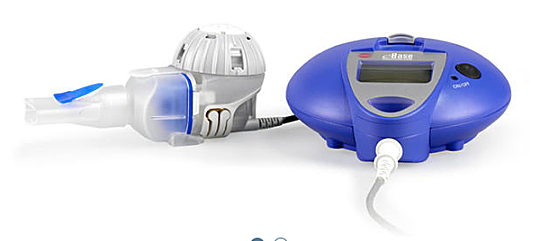In a recently completed Gilead Sciences, Inc.-sponsored Open Label Interventional clinical trial entitled “Evaluation of the Quality of Life Questionnaire-Bronchiectasis (QOL-B) in Patients With Bronchiectasis” (ClinicalTrials.gov Identifier: NCT00805025), over the 70-day study period, eligible participating patients who participated were required to visit the study clinic every two weeks (for a total of six visits), and received a 28-day course of the drug aztreonam for inhalation solution (AZLI). The Quality of Life-Bronchiectasis (QOL-B) questionnaire was completed at several time points during the study, in addition to pulmonary function testing and other standard procedures.
The purpose of the trial is to evaluate perception of symptom improvement following one course of aztreonam for inhalation solution (azli) in subjects with bronchiectasis and gram-negative bacteria in the airways, and to validate the quality and reliability of the respiratory domain of the Life Questionnaire-Bronchiectasis.
Patients with Cystic Fibrosis (CF) often experience lung infections that occur repeatedly or worsen over time, which are often caused by a bacteria called Pseudomonas aeruginosa (PA). Treatment with antibiotics can stop or slow down the growth of the bacteria. The antibiotics may be given by mouth, intravenously (IV), or by inhalation as a mist as in the case of aztreonam for inhalation solution (AZLI – trade name “Cayston”), an investigational formulation of the antipseudomonal antibiotic developed by Gilead Sciences, Inc. Cayston, the first new inhaled antibiotic developed for CF in more than a decade, is a new inhaled antibiotic for CF approved by the U.S. Food and Drug Administration in February 2010. For the clinical trial, aztreonam for inhalation solution (AZLI) 75 mg was administered three times daily using the PARI Investigational eFlow Nebulizer System by PARI GmbH, (with a minimum of four hours between doses) following administration of a short-acting bronchodilator.
The trial documentation notes that test-retest reliability is a measure of the stability or reproducibility of a measure over a period of time during which status on the underlying construct has not changed, and is measured by the intraclass correlation of scores obtained at two time points within that period. In this trial, participants were evaluated beginning 14 days prior to starting a 28-day course of AZLI (Day 0 to Day 28), followed by post-treatment assessments every 14 days through Day 56, for a total of 70 days of participation in the study. Test-retest reliability of respiratory symptoms was calculated for response at Day -14 and Day 0. Reliability of the participants’ QOL-B responses was assessed from an Intraclass Correlation Coefficient (ICC). A score of ≥ 0.70 would indicate strong reliability. The QOL-B respiratory symptoms score was transformed onto a scale of 0-100, with higher scores representing a better quality of life.
Convergent validity was assessed at Day -14 by examining the correlations between relevant QOL-B domains and other indicators of health status: a bronchiectasis severity score based on high-resolution computerized tomography (HRCT) scan results, forced expiratory volume in 1 second (FEV1) percent predicted, 6-minute walk test (6MWT) results, and St. George’s Respiratory Questionnaire (SGRQ) symptoms scores. Correlations with absolute values of 0.30 to 0.50 indicated moderate evidence of convergent validity.
Secondary Outcome Measures were to measure responsiveness of the respiratory domain of the QOL-B as assessed by the anchor-based minimal clinically important difference (mcid) following categorization of level of change using the Global Rating of Change Questionnaire (GRCQ). The anchor-based method measured the participant’s perception of change at Day 28 using the GRCQ, which assesses improving or worsening symptoms as the case may be.
Preliminary results of the then ongoing trial were published in the American College of Chest Physicians journal Chest in an Original ResPhysiciansr entitled “A Preliminary Quality of Life Questionnaire-Bronchiectasis: A Patient-Reported Outcome Measure for Bronchiectasis“ (Chest. 2014;146(2):437-448. doi:10.1378/chest.13-1891). Lead author was Alexandra L. Quittner, PhD of the University of Miami Child Division, with coauthors Kristen K. Marciel, PhD; Matthias A. Salathe, MD, FCCP; Anne E. O’Donnell, MD, FCCP; Mark H. Gotfried, MD, FCCP; Jonathan S. Ilowite, MD, FCCP; Mark L. Metersky, MD, FCCP; Patrick A. Flume, MD; Sandra A. Lewis, MS; Matthew McKevitt, PhD; A. Bruce Montgomery, MD; Thomas G. O’Riordan, MD; Alan F. Barker, MD, FCCP. The researchers observe that the trial’s content validity, cognitive testing, responsivity to open-label treatment, and initial psychometric analyses supported QOL-B items and structure, concluding that interim QOL-B “is a promising tool for evaluating the efficacy of new therapies for patients with bronchiectasis, and for measuring symptoms, functioning, and quality of life in these patients on a routine basis.” They suggest that a final psychometric validation study is needed and is forthcoming.
Cayston’s developer, Gilead Sciences, Inc. is a California based biopharmaceutical research company that discovers, develops and commercializes innovative medicines with the objective of transforming and simplifying care for people with life-threatening illnesses globally. Gilead’s portfolio of products and pipeline of investigational drugs includes treatments for HIV/AIDS, liver diseases, cancer, inflammatory and respiratory diseases, and cardiovascular conditions. Founded in 1987, Gilead has since grown to become one of the world’s largest biopharmaceutical companies, with more than 7,000 employees across six continents.
Gilead’s research and development program identifies and evaluates investigational compounds that show potential to advance the treatment of life-threatening diseases in areas of unmet medical need.
Sources:
ClinicalTrials.gov (NCT00805025)
Gilead Sciences, Inc.
CHEST
Cystic Fibrosis Foundation
PARI GmbH
Wikipedia
Image Credits:
PARI GmbH

